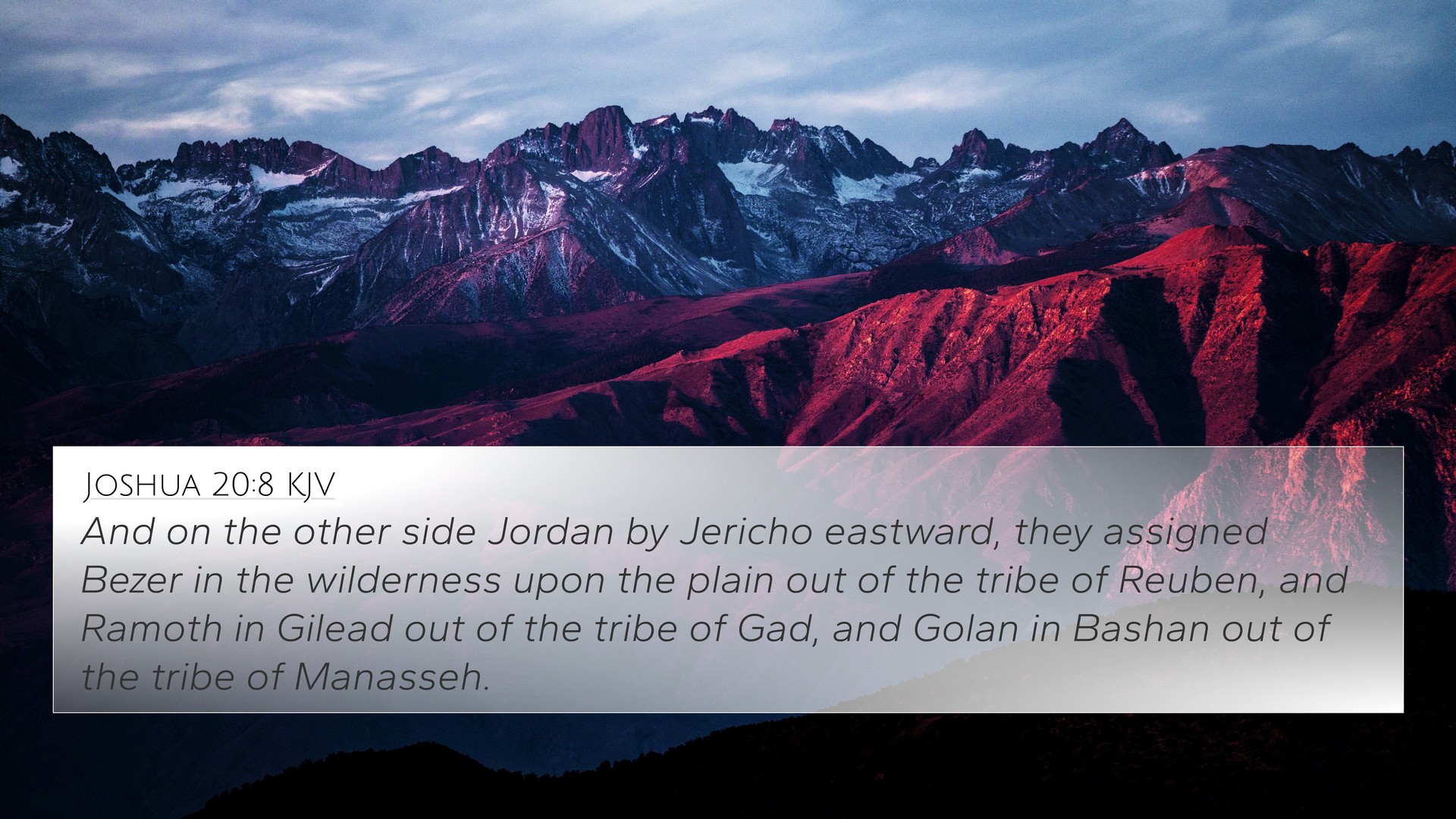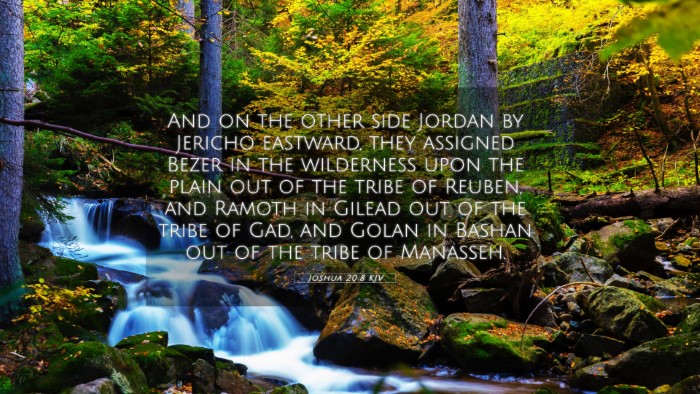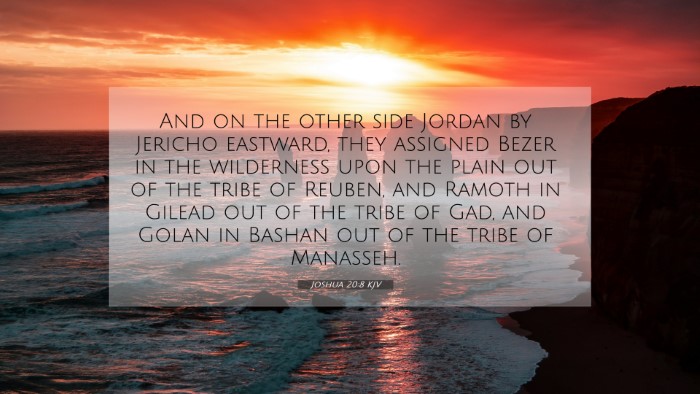Old Testament
Genesis Exodus Leviticus Numbers Deuteronomy Joshua Judges Ruth 1 Samuel 2 Samuel 1 Kings 2 Kings 1 Chronicles 2 Chronicles Ezra Nehemiah Esther Job Psalms Proverbs Ecclesiastes Song of Solomon Isaiah Jeremiah Lamentations Ezekiel Daniel Hosea Joel Amos Obadiah Jonah Micah Nahum Habakkuk Zephaniah Haggai Zechariah MalachiJoshua 20:8 Similar Verses
Joshua 20:8 Cross References
And on the other side Jordan by Jericho eastward, they assigned Bezer in the wilderness upon the plain out of the tribe of Reuben, and Ramoth in Gilead out of the tribe of Gad, and Golan in Bashan out of the tribe of Manasseh.
Uncover the Rich Themes and Topics of This Bible Verse
Listed below are the Bible themes associated with Joshua 20:8. We invite you to explore each theme to gain deeper insights into the Scriptures.
Joshua 20:8 Cross Reference Verses
This section features a detailed cross-reference designed to enrich your understanding of the Scriptures. Below, you will find carefully selected verses that echo the themes and teachings related to Joshua 20:8 KJV. Click on any image to explore detailed analyses of related Bible verses and uncover deeper theological insights.
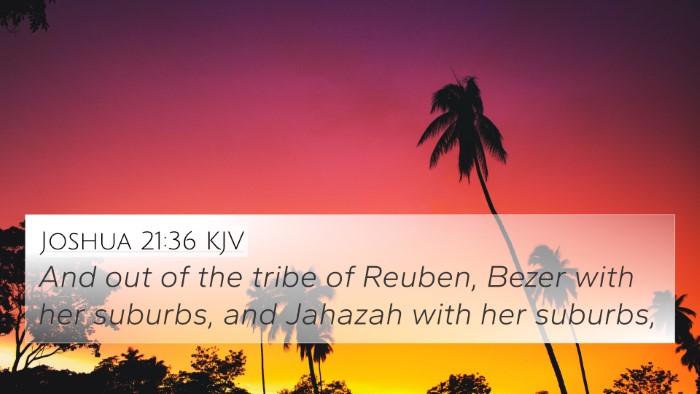
Joshua 21:36 (KJV) »
And out of the tribe of Reuben, Bezer with her suburbs, and Jahazah with her suburbs,
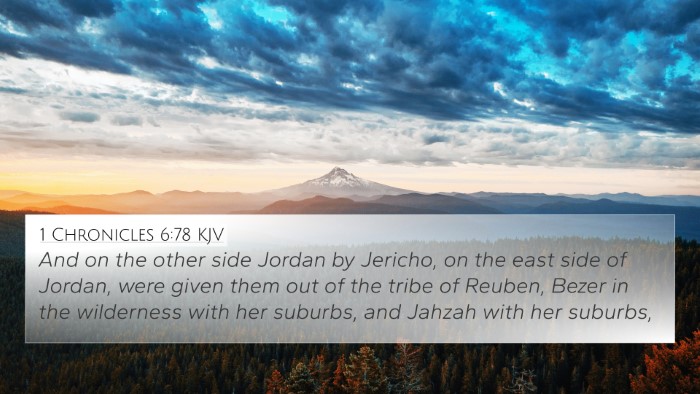
1 Chronicles 6:78 (KJV) »
And on the other side Jordan by Jericho, on the east side of Jordan, were given them out of the tribe of Reuben, Bezer in the wilderness with her suburbs, and Jahzah with her suburbs,
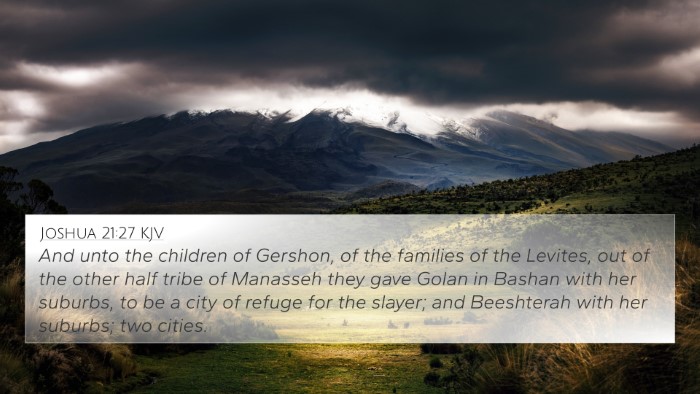
Joshua 21:27 (KJV) »
And unto the children of Gershon, of the families of the Levites, out of the other half tribe of Manasseh they gave Golan in Bashan with her suburbs, to be a city of refuge for the slayer; and Beeshterah with her suburbs; two cities.
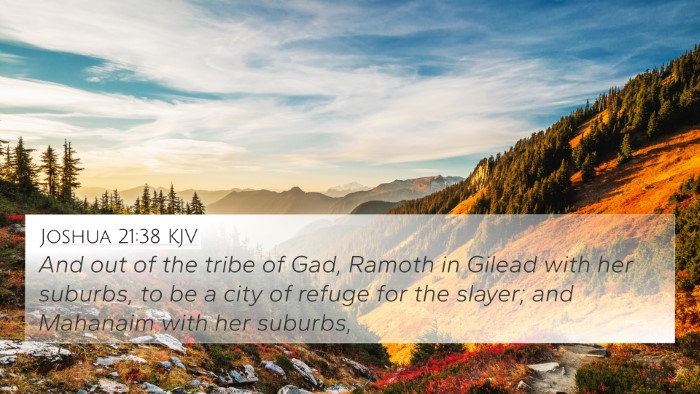
Joshua 21:38 (KJV) »
And out of the tribe of Gad, Ramoth in Gilead with her suburbs, to be a city of refuge for the slayer; and Mahanaim with her suburbs,
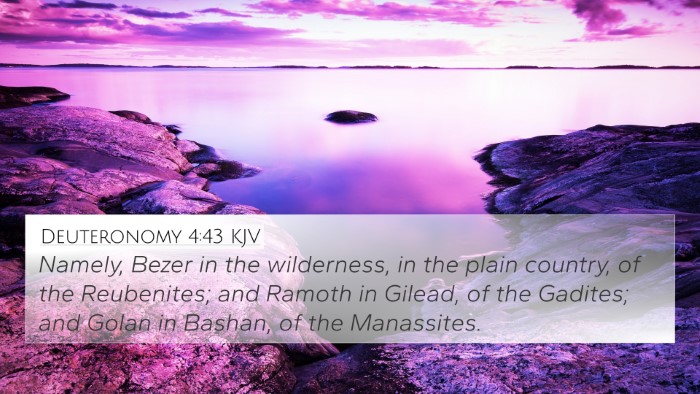
Deuteronomy 4:43 (KJV) »
Namely, Bezer in the wilderness, in the plain country, of the Reubenites; and Ramoth in Gilead, of the Gadites; and Golan in Bashan, of the Manassites.

1 Kings 22:6 (KJV) »
Then the king of Israel gathered the prophets together, about four hundred men, and said unto them, Shall I go against Ramothgilead to battle, or shall I forbear? And they said, Go up; for the LORD shall deliver it into the hand of the king.
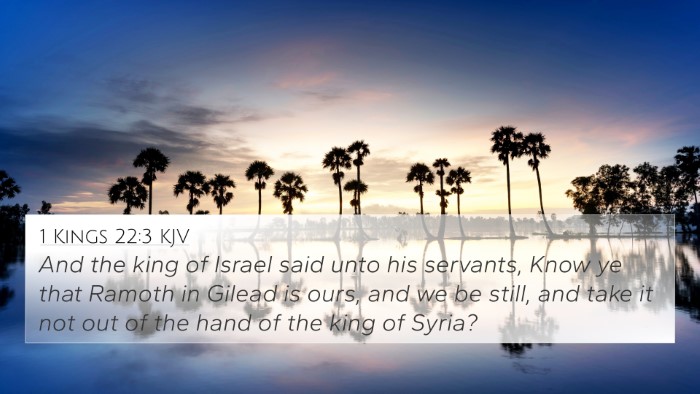
1 Kings 22:3 (KJV) »
And the king of Israel said unto his servants, Know ye that Ramoth in Gilead is ours, and we be still, and take it not out of the hand of the king of Syria?
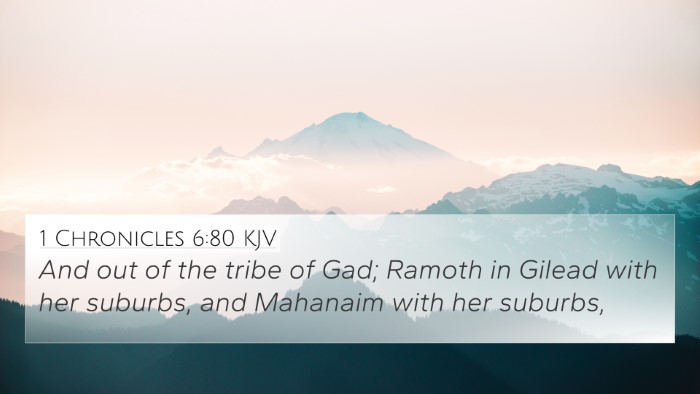
1 Chronicles 6:80 (KJV) »
And out of the tribe of Gad; Ramoth in Gilead with her suburbs, and Mahanaim with her suburbs,
Joshua 20:8 Verse Analysis and Similar Verses
Understanding Joshua 20:8
Verse: Joshua 20:8 states, "And on the other side Jordan, by Jericho, eastward, they assigned Bezer in the wilderness, and the city of refuge for the Reubenites; and Ramoth in Gilead, the city of refuge for the Gadites; and Golan in Bashan, the city of refuge for the Manassites."
Summary of Meaning
This verse outlines the establishment of cities of refuge by the Israelites, where individuals who committed unintentional manslaughter could flee for safety. This system served to provide a means of justice, reflecting God's grace and mercy amidst the consequences of sin.
Contextual Insights
In this chapter, God instructs Joshua on the cities of refuge, which play a crucial role in the judicial and social structure of Israel. The cities mentioned in this verse, Bezer, Ramoth, and Golan, emphasize God's provision for justice.
Public Domain Commentaries
- Matthew Henry: He emphasizes the importance of mercy and God's provision for those who inadvertently cause harm. The cities of refuge were both protective and redemptive, highlighting the principle that God values human life and provides for the innocent.
- Albert Barnes: Barnes notes that these locations were strategically chosen to be accessible, indicating God's desire for justice to be readily available. The designation of these cities represents a divine system for reconciliation and the protection of life.
- Adam Clarke: Clarke delves into the significance of the cities’ locations and their roles. He highlights how the refuge cities underscore God's mercy and the seriousness of unintentional actions, advocating for a fair trial instead of immediate vengeance.
Bible Cross-References
Joshua 20:8 has several important cross-references that enhance our understanding of the themes of refuge and justice:
- Numbers 35:6-15: The initial establishment of cities of refuge for those who kill unintentionally.
- Deuteronomy 19:1-10: Details on the laws concerning cities of refuge and the conditions for their sanctity.
- Hebrews 6:18: The New Testament reference that draws on the theme of refuge in Christ, who is our ultimate refuge.
- Exodus 21:12-14: The laws concerning manslaughter and the cities of refuge for those who seek protection.
- Psalms 46:1: "God is our refuge and strength," paralleling the idea that God provides a place of safety for His people.
- Matthew 5:21-22: Jesus’ teaching on murder and reconciliation connects the New Testament understanding of murder and the heart issues behind it.
- Proverbs 18:10: "The name of the Lord is a strong tower; the righteous run to it and are safe," reinforcing the theme of God as a refuge.
Thematic Bible Verse Connections
Joshua 20:8 connects with broader Biblical themes such as:
- God’s Justice: The establishment of refuge highlights God’s balance of justice and mercy.
- Human Life & Protection: This verse reflects the sanctity of human life and the provision for peace amidst conflict.
- Forgiveness & Redemption: The refuge represents a place for redemption and the theological understanding of safety in the presence of God.
Connecting Old and New Testaments
Joshua's cities of refuge not only reflect God's laws in the Old Testament but also prefigure the sanctuary found in Jesus Christ in the New Testament, as He becomes the ultimate refuge for sinners seeking salvation.
Conclusion
In Joshua 20:8, we find a clear articulation of God's provision for justice combined with mercy. The insights derived from public domain commentaries offer a rich understanding of the theological implications surrounding the cities of refuge, further enhanced by cross-referencing relevant scriptures.
